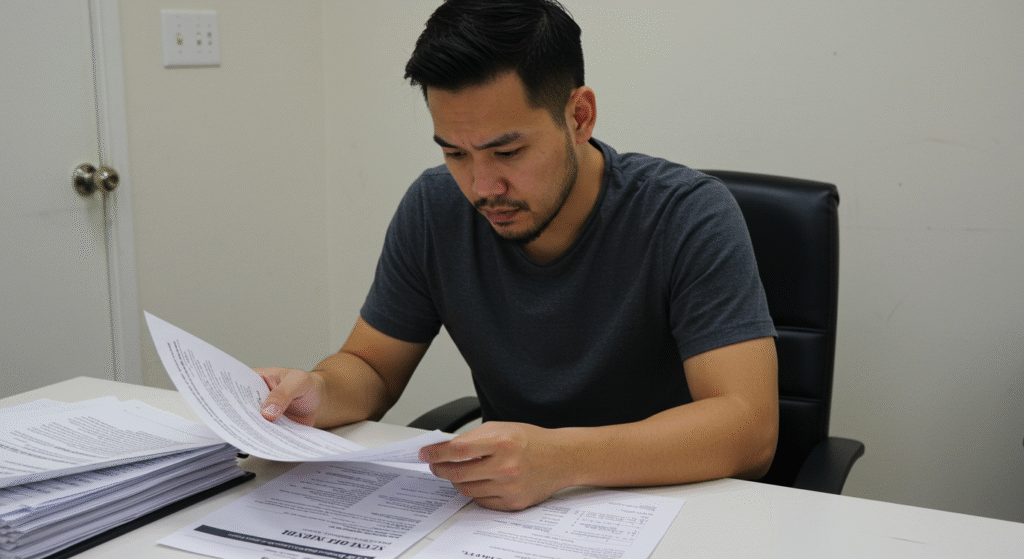A tax audit can quickly turn from a routine check into a stressful experience. It’s an official review of your financial records conducted by tax authorities to verify accuracy in your filings. While the idea of an audit might make anyone uneasy, the key to staying calm is straightforward: preparation. Knowing what to expect and having your documents organized takes the fear out of the unknown and puts you in control.
In this article, I’ll walk you through clear steps to get ready for a tax audit without panic. You’ll learn how to handle common concerns, gather necessary records, and communicate effectively with auditors. By focusing on practical actions, you’ll face the process with confidence, not dread. Preparing well means you’ll be ready to respond calmly and accurately, making the audit less daunting than it seems.
Understanding the Basics of a Tax Audit

Facing a tax audit might sound intimidating, but knowing what it really involves can make a huge difference. A tax audit is simply an official review of your tax returns and financial records by the tax authority to check for accuracy and compliance. It’s not always about finding something wrong; many audits confirm everything is in order. When you understand the different types of audits and what can trigger one, you get a clear picture of what to expect, which helps keep panic at bay.
Types of Tax Audits
Tax audits come in different shapes and levels of complexity. Knowing how each one works helps you prepare better and maybe even reduce the stress of the process.
- Correspondence Audits
This is the most common type. It happens mostly through mail, so you won’t have to meet the auditor face-to-face. The tax office will request additional information or clarification about specific parts of your return. Often, these focus on simple issues like verifying a deduction or correcting math errors. You’ll receive a letter outlining what documents they need, and once you send those in, it may be resolved within a few months. - Office Audits
Less frequent than correspondence audits, office audits require you to visit the tax office in person. They ask for more detailed records and might involve direct discussions about portions of your tax return that raised questions. For example, if you have complicated business expenses or rental income, the auditor will want to examine your supporting documents closely during this meeting. - Field Audits
These are the most thorough and involve an auditor coming directly to your home or business to review your records on-site. Since this is more intrusive, it usually happens when the tax authority wants an in-depth check of your financial activities. Field audits can last several days or longer, depending on the complexity of what’s being investigated.
Common Audit Triggers to Watch For
Certain things can increase the odds that your return gets an audit. Awareness of these red flags helps you avoid mistakes and prepare solid documentation if you do get selected.
Some frequent triggers include:
- Missing Income
Failing to report all your income, such as cash payments or freelance work, is a big warning sign. The IRS often cross-references your reported income with information from employers and banks. - Large Deductions
Claiming unusually high deductions compared to your income invites closer scrutiny. This can include oversized business expenses or home office deductions that look disproportionate. - Significant Fluctuations in Income or Expenses
If your income or expenses suddenly jump or drop a lot from year to year without a clear explanation, auditors tend to ask questions. - Questionable Credits or Claims
Taking tax credits or filing claims that don’t match your financial profile can trigger an audit. Examples include claiming education credits without proper receipts or business credits lacking adequate proof.
By understanding these audit types and knowing what puts you under the microscope, you’re better prepared to handle a tax audit calmly and effectively. The key is keeping detailed, organized records and staying honest and clear about your finances. This approach makes the process less intimidating and far easier to manage.
Preparing Your Documents and Records

One of the smartest moves you can make when preparing for a tax audit is to get your documents in order. It’s not just about having everything on hand but organizing your records so you can find exactly what you need, when you need it. Well-organized records reduce stress, save precious time, and help you respond clearly if the auditor asks questions. Plus, it signals that you take your tax responsibilities seriously.
Organizing Records Effectively
Think of your tax documents like a finely tuned filing cabinet that needs to be easy to navigate. When tax season or an audit arrives, scrambling through piles of papers only adds frustration. Here’s how I keep my records neat and accessible:
- Sort by category. Group documents into clear buckets such as income statements (W-2, 1099s), expenses (receipts, invoices), assets (property records, purchase receipts), and deductions (charitable donations, education expenses). This simplifies finding exactly what an auditor requests without having to dig through everything.
- Use folders or digital tools. Physical folders with labels work well for paper documents; meanwhile, scanning and naming files consistently on your computer or cloud storage offers quick retrieval. Apps that track expenses, or even a simple spreadsheet, can keep digital records organized by date and category.
- Keep records for at least three years. Tax authorities typically have a three-year window to audit your returns. Holding onto your documents for this period keeps you covered in case of audits. For certain cases involving substantial underreporting, six or seven years may be advisable. This practice protects you and avoids the headache of lost paperwork later on.
Being methodical pays off. Think of your records as your tax audit toolkit. The better organized they are, the faster you can show proof and move through the audit without unnecessary delays or stress.
Accuracy and Honesty in Reporting
Nothing reduces audit headaches like being completely honest and precise in your tax reporting. Misreporting income or exaggerating deductions can trigger alarms and lead to deeper scrutiny.
- Report all income. Include every source of income, even small freelance jobs, side gigs, or cash payments. The IRS and other tax authorities cross-check your reported earnings with data from employers, banks, and other third parties. Leaving something out might seem harmless but can create problems if discovered.
- Avoid inflating deductions. Claim only what you can support with valid receipts and documentation. Overstating expenses or deductions not only invites audits but risks penalties.
- Double-check your numbers before filing. Look over calculations carefully or use reliable tax software that automatically checks for math errors. Any mistakes caught early reduce your chances of audit flags or corrections after filing.
- Make timely corrections if needed. If you spot an error after filing, file an amendment promptly. Being proactive shows cooperation and limits potential penalties later.
Honesty and detail don’t just protect you; they build trust with auditors. The clearer and more truthful your records and reports, the quicker an audit can wrap up. Remember, the goal is to prove your tax return is correct, not to evade or confuse.
Getting your documents and records ready is the foundation of preparing for a tax audit. When you organize efficiently and report accurately, you gain control and lower your stress. This part of the process sets you up to face auditors with confidence, showing that your financial house is in order.
How to Respond Calmly and Effectively to an Audit Notice

Getting an audit notice can feel like a sudden jolt, but how you respond makes all the difference. Staying calm and acting strategically helps you handle the situation with confidence instead of anxiety. The goal is to understand what’s expected of you, communicate clearly, and know when to bring in help. Below, I break down how to approach an audit notice step-by-step, focusing on your rights and duties, managing communications with the IRS, and when to consider professional assistance.
Understanding Your Rights and Responsibilities
When the IRS sends an audit notice, remember that you have important rights that protect you during the audit process. You’re not on your own.
- Right to Representation
You can work with a trusted advisor like a CPA, attorney, or enrolled agent. They can communicate with the IRS on your behalf, which often reduces pressure and errors. - Right to Confidentiality
Information about your audit is private. The IRS must follow strict rules about handling your financial details.
On the flip side, you also have responsibilities that help the process move smoothly.
- Provide Accurate Information Promptly
Respond with clear, honest answers and supply the requested documents within deadlines. Delays or false information only complicate your case. - Keep Records Organized and Complete
This shows you take the audit seriously. It also makes it easier to address the IRS’s questions quickly.
Knowing your rights gives you confidence, while meeting your responsibilities shows cooperation. Both reduce stress and pave the way for a fair audit.
Managing Communication with the IRS
Communication during an audit can feel intimidating, but keeping it professional and focused is key.
- Respond Only to What’s Asked
It’s tempting to offer extra explanations, but unnecessary details can confuse the situation. Stick to facts and documents requested. - Keep Copies of Everything
Save all letters, emails, and forms you send or receive. This record helps track the conversation and protects you if questions arise later. - Maintain Professional Tone
Whether you’re writing or speaking with an auditor, treat all interactions respectfully and clearly. Being polite but direct helps create a constructive atmosphere. - Use Written Responses When Possible
Written communication leaves a paper trail and allows you to carefully craft your replies. If a phone conversation happens, follow up with a summary email to confirm what was discussed.
By managing communication carefully, you avoid misunderstandings and keep the audit process straightforward and efficient.
When to Hire a Tax Professional
Some audits are straightforward, but others can get complicated fast. Knowing when to bring in a tax professional makes a big difference.
- Complex Situations
If your audit involves business income, multiple sources of revenue, or legal questions, a CPA or enrolled agent can navigate these details better than going it alone. - Feeling Overwhelmed or Confused
Professionals have experience dealing with auditors. They know what to expect and how to respond calmly without making mistakes. - Representation and Negotiation
A tax pro can represent you fully, communicating directly with the IRS. This can reduce stress and speed up resolution. - Avoiding Costly Errors
Mistakes in audit responses can lead to penalties or extended investigations. Tax experts can help you avoid these risks.
Hiring a professional is an investment in peace of mind and accuracy. If you’re unsure, even a consultation can clarify your next steps and protect your interests.
Taking control after an audit notice means knowing your rights, communicating with care, and getting help when needed. With a calm approach, you’re in a stronger position to navigate the audit without feeling overwhelmed or panicked. The process becomes less about fear and more about proving your case clearly and fairly.
Maintaining a Positive Mindset Throughout the Audit Process

Facing a tax audit can feel like stepping into unknown territory, but keeping a positive mindset plays a huge role in managing stress and staying in control. When you approach the audit with clear organization and calm focus, you reduce friction and handle requests more smoothly. It helps to remember that audits are often routine and resolve efficiently when you stay prepared and cooperative. Below, I break down practical ways to stay centered during the audit process.
Staying Organized and Meeting Deadlines
Organization is your best defense against audit stress. When you keep thorough records and meet deadlines promptly, you avoid giving auditors reasons to dig deeper or delay the process. Think of it as building a bridge that connects your side to the auditor’s, making the journey straightforward and quick.
Here’s why staying organized helps:
- Prevents missed deadlines: Timely submission of requested documents means the audit process moves forward without penalties or extensions.
- Simplifies document retrieval: Grouping your files by category income, expenses, deductions lets you pull what’s needed without scrambling.
- Boosts your confidence: Knowing exactly where each important paper is stored keeps panic at bay during the pressure of review.
- Signals professionalism: Organized records demonstrate seriousness about your tax responsibilities and build trust with auditors.
To keep on top of paperwork, I recommend:
- Using labeled folders or digital filing systems to separate receipts, statements, and correspondence.
- Creating a calendar reminder for deadlines and follow-ups.
- Double-checking documentation before sending it to ensure nothing is missing or unclear.
Meeting deadlines and keeping your paperwork neat isn’t just about compliance. It shapes your entire experience into less of a hassle and more of a clear, manageable process.
Keeping Perspective and Avoiding Panic
The mental battle during an audit can be as challenging as the paperwork itself. But maintaining perspective helps keep fear out of the picture. Most audits are not about catching you in a mistake; they are routine checks. Approaching the situation with this mindset changes how you feel and act.
Here’s how I keep calm:
- Shift focus from fear to facts: Remind myself the audit is about verifying numbers, not a personal attack.
- Practice deep breathing or short walks: These simple actions clear the mind and reduce anxiety when stress rises.
- Take it one step at a time: Instead of worrying about the entire process, I focus on completing small tasks—organizing a file, responding to one request—step by step.
- Accept that perfection isn’t required: Honest mistakes happen; what matters is transparency and correcting errors if found.
- Remember the goal: The audit will end, often with no penalties if you’re prepared and honest.
Audits can feel like a mountain to climb, but keeping perspective lets you take manageable steps rather than hoping for a leap over the entire climb. The more you practice calm, the easier it gets to stay steady.
Both staying organized and adopting a calm, realistic mindset help me turn what could be a stressful ordeal into a process I control confidently. These habits don’t just help during the audit but prepare me for smoother tax filing every year.
Conclusion
Preparing well for a tax audit is the best way to face it without panic. Keeping your documents organized, reporting your income and deductions honestly, and responding calmly to any IRS requests puts you firmly in control. This approach removes much of the stress and uncertainty that typically comes with audits. When you understand the process and handle it with clear, accurate information, you improve your chances for a smooth, favorable outcome.
Staying calm and prepared turns an audit from a challenge into a manageable step. It pays to invest time in getting your records right and knowing your rights. Remember, the goal is to show correctness, not to fear scrutiny.
Thank you for reading. If you have experiences with audits or tips to share, please leave a comment. Following this blog means you’ll get more clear advice to keep your financial matters hassle-free.




